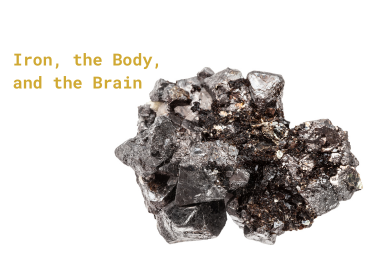Iron, the Body, and the Brain
Iron is a mineral that is naturally occurring in the Earth’s crust and in the tissues of organisms living on Earth, including ours. Here are some neat facts about iron:
About three quarters of the iron in the human body is found in the hemoglobin of red blood cells.
Iron is the second most abundant metal on Earth, second to aluminum, and composes around 80% of the planet’s inner and outer cores.
Iron is essential to making steel.
Iron is the main ingredient for meteorites.
Iron has an important role in our bodies and helps maintain our physical health, which is essential for our mental health.
Iron helps govern oxygen transportation as well as the formation of energy to run our cells through what we call the ETC, or electron transport chain. In this way, iron is involved in synthesizing amino acids, hormones, collagen, and neurotransmitters. Neurotransmitters are chemical messages that the brain sends to different parts of itself to communicate with itself and the rest of the body. Without iron, we cannot think or even survive.
Here are a few more things iron does for us:
Iron is a part of myoglobin, which is a protein that holds and releases oxygen in our muscle cells.
Iron is important for healthy connective tissue.
Iron is essential for a strong immune system.
The iron in our blood and tissues helps keep our hearts beating strong.
That’s why it’s so important to make sure that our iron levels are in the right place, and the best way to do that is through our diets. Unfortunately, we can’t make our own iron in our bodies. We have to get it from our food or in supplement form.
Here are the best foods for getting your iron needs met:
Red meat, poultry, and seafood are all rich in iron, but don’t eat liver if you’re pregnant.
Eggs, especially egg yolk.
Dark leafy greens like spinach, which are great sources for other vitamins too.
Dried fruits like figs, dates, and raisins.
All sorts of nuts, but especially pistachios and cashews.
Another neat way to supplement your iron intake is to use cast iron cookware like skillets and saucepans. Acidic foods like tomatoes and apples are good at absorbing iron from cookware.
Iron deficiency is linked to some serious physiological conditions. One of the most common maladies is anemia. Anemia is characterized by sallow skin, fatigue, chest pain, and shortness of breath. Fortunately, this is easily treated by general physicians with iron supplements and diet tips.
These are some more problems linked to insufficient iron:
Poor brain development and cell replacement, leading to all kinds of psychiatric symptoms, from confusion to an increased risk of dementia.
Poor sleep quality, leading to daytime fatigue.
Imbalances in neurotransmitters like GABA and glutamate, which help govern learning, memory retention, and judgment.
Any of these problems can cause or exacerbate poor mental health. It’s easy to forget how much our health below the neck impacts our brain health, and thus our mental health. It’s hard to stay upbeat when you’re irritable from a bad night of sleep, your brain isn’t communicating with itself as well as it could, and you can’t take a proper deep breath to get up a flight of steps.
On the other hand, too much iron can lead to gastrointestinal issues and liver damage. Don’t start any new diet or supplement regimen without consulting your general physician. If you suspect your iron levels aren’t where they need to be, or if you’re experiencing symptoms of depression like low mood, fatigue, an urge to withdraw, etc., ask your doctor to run a metabolic panel to get a holistic view of your health.
Talk to us anytime by writing to us on our website, or call us at (585) 442-6960. Everyone deserves help to get a better quality of life, and we’re ready when you need us.




